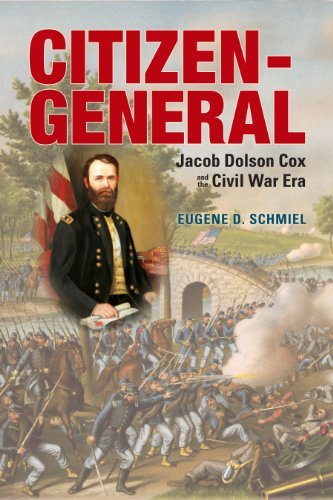 Image 1 of 1
Image 1 of 1


Citizen-General: Jacob Dolson Cox and the Civil War Era.
The Civil War transformed not only the United States but also the men unexpectedly called on to lead their fellow citizens to war. Jacob Donelson Cox, a former divinity student with no formal military training, rose to the challenge, becoming one of the better commanders in the Union army. His military career included helping secure West Virginia for the Union army; jointly commanding the left wing of the Union army at the critical battle of Antietam; breaking the Confederate supply line and thereby precipitating the fall of Atlanta; and holding the defensive line a the Battle of Franklin, a Union victory that effectively ended the Confederate thread in the West.
At a time when the self-made man was the standard for success, Cox fashioned himself into a Renaissance man. In each of his vocations and avocations—general, governor, cabinet secretary, university president, law school dean, railroad president, historian, and scientist—he was recognized as a leader. Cox earned his greatest fame, however, the the foremost participant historian of the Civil War. His accounts of the conflict are to this day cited by serious scholars and serve as a foundation for the interpretation of many aspects of the war.
The Civil War transformed not only the United States but also the men unexpectedly called on to lead their fellow citizens to war. Jacob Donelson Cox, a former divinity student with no formal military training, rose to the challenge, becoming one of the better commanders in the Union army. His military career included helping secure West Virginia for the Union army; jointly commanding the left wing of the Union army at the critical battle of Antietam; breaking the Confederate supply line and thereby precipitating the fall of Atlanta; and holding the defensive line a the Battle of Franklin, a Union victory that effectively ended the Confederate thread in the West.
At a time when the self-made man was the standard for success, Cox fashioned himself into a Renaissance man. In each of his vocations and avocations—general, governor, cabinet secretary, university president, law school dean, railroad president, historian, and scientist—he was recognized as a leader. Cox earned his greatest fame, however, the the foremost participant historian of the Civil War. His accounts of the conflict are to this day cited by serious scholars and serve as a foundation for the interpretation of many aspects of the war.
